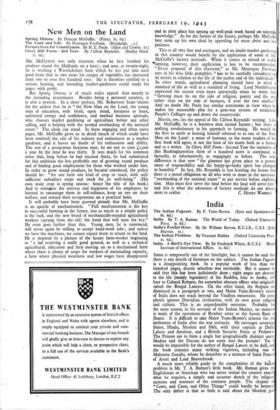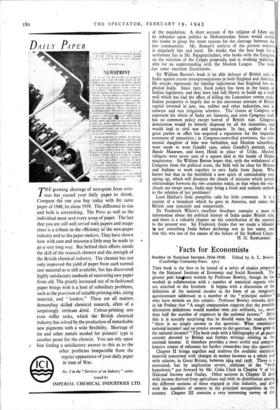India -
The Indian Pageant. By F. Yeats-Brown. (Eyre and Spottiswoode. 8s. 6d.) India. By T. A. Raman. The World of Today. (Oxford University Press. 3s. 6d.) India's Fateful Hour. By Sir William Barton, K.C.I.E., C.S.I. (John Murray. 5s.) The Indian Problem. By Viscount Halifax (Oxford University Pres. is. 6d.) India. A Bird's-Eye View. By Sir Frederick Whyte, K.C.S.I. (Royal Institute of International Affairs. is. 6d.)
INDIA is temporarily out of the limelight, but it cannot be said that there is any dearth of literature on the subject. The Indian Pageant is a disappointing book. In a popular work of less than ewe hundred pages, drastic selection was inevitable. But it cannot be said that this has been judiciously done ; eight pages are- devoted to the life (mostly legendary) of the Buddha, four to Asoka, and four to Colonel Robarts, the somewhat obscure officer who originally raised the Bengal Lancers. On the other hand, the Rajputs are dismissed in a paragraph or two, and Major Yeats-Brown's vision of India does not reach beyond the Vindhya mountains. He com- pletely ignores Dravidian civilisation, with its own great religion and culture. This is an unpardonable omission. Probably for the same reason, in his account of the Indian Mutiny, no mention is made of the operations of Bombay army -or the heroic Rani of Jhansi. It is difficult to take Major Yeats-Brown's scheme for the settlement of India after the war seriously. He envisages sovereign States, Hindu, Moslem and Sikh, with their capitals at Delhi, Lahore and Amritsar, and a British Security Force at Peshawar. The Princes are to form a single but geographically disjunct unity. Madras and the Deccan do not come into the picture! Yet it would be impossible for the author of Bengal Lancer to be dull, and the book contains many striking vignettes, including one of Mahatma Gandhi, whom he-describes as a mixture of Saint Francis of Assisi and Lord Beaverbrook. A much more reliable guide to the complexities of the Indian problem is Mr. T. A. Raman's little book. Mr. Raman gives the Englishman or American who has never visited the country exacth what he requires, a simple and accurate sketch of the religious customs and manners of the common people. The chapter co " Cows, and Caste, and Other Things " could hardly be bettered The only defect is that so little is said about the Moslem pail
of the population. A short account of the religion of Islam and its influence upon politics in Mohammedan States would enable the reader to grasp the inner reasons for the cleavage between the two communities. Mr. Raman's analysis of the present impasse is singularly fair and lucid. He thinks that the best hope for a settlement lies in Mr. Rajagopalachari, who broke with the Congress on the rejection of the Cripps proposals, and is working indefatig- ably for an understanding with the Moslem League. The book .has some excellent illustrations.
Sir William Barton's book is an able defence of British rule in India against recent misrepresentations in both England and America. He attacks vigorously the familiar indictment that England has ex- ploited India. Since 1921, fiscal policy has been in the hands of Indian legislators, and they have had full liberty to build up a tariff wall which has had the effect of killing the Lancashire cotton trade. Indian prosperity is largely due to the enormous amount of British capital invested in jute, tea, rubber and other industries, and in railways and vast irrigation schemes.• The' claims of Congress to represent the whole of India are fantastic, and even Congress itself has no common policy except hatred of British rule. Congress domination would be bitterly disputed by all the minorities, and would lead to civil war and massacre. In fact, neither of the great parties in office has acquired a reputation for the impartial treatment of minorities ; in Congress-controlled provinces, the cere- monial slaughter of kine was forbidden, and Moslem schoolboys were made to wear Gandhi caps, salute Gandhi's .portrait, sing Bande Mataram, and learn Hindi in place of Urdu. Moslem villagers were never sure of a square deal at the hands of Hindu magistrates. Sir William Barton hopes that, with the withdrawal of Congress from the political scene, the field will be clear for Britons and Indians to work together to save India from Japan. Who knows but that in the battlefield a new spirit of comradeship may spring up, which will dissipate the clouds of mistrust which poison relationships between the two countries today, so that when the war- clouds are swept away, India may bring a fresh and realistic outlook to the solution of her problems?
Lord Halifax's little pamphlet calls for little comment. It is a reprint of a broadcast which he gave in America, and states the British case concisely and temperately.
Sir Frederick Whyte's excellent brochure contains a mass of information about the political history of India under British rule, and there is a valuable chapter on the contribution of the country to the present war. Sir Frederick thinks that we made a blunder is not consulting India before declaring war in her name, and that this was one of the causes of the failure of Sir Stafford Cripps.
H. G. RAWLINSON.



























 Previous page
Previous page